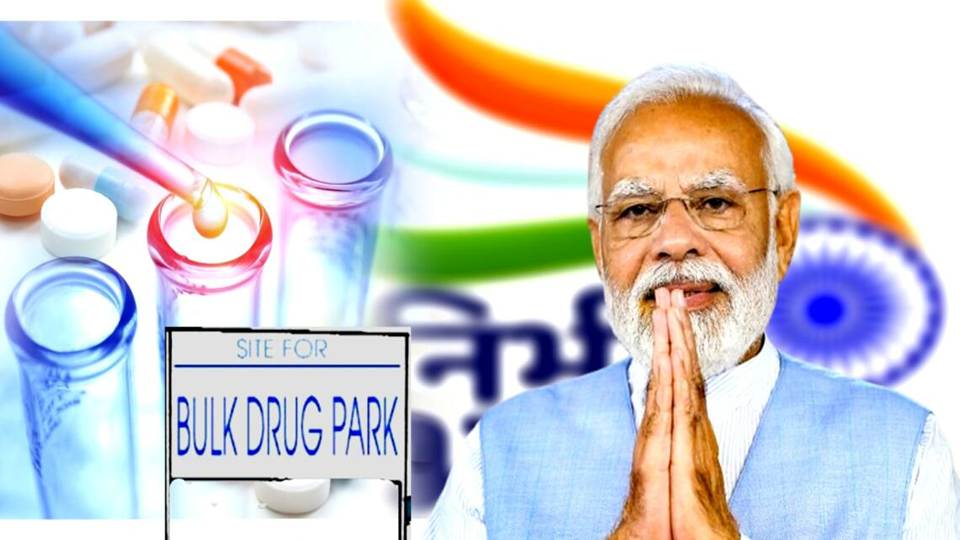During the peak times of Covid Pandemic, PM Narendra Modi gave a clarion call of Atmanirbhar Bharat. He emphasised that the nation needs to be optimistic and turn Covid crisis into opportunity to create Atmanirbhar Bharat. Initially, the target seemed to be far reaching but several government initiatives have started to bear fruits. The Production Linked Incentive (PLI) schemes in particular have changed the dynamic completely. Now, its success is quite evident in the pharmaceutical industry.
India’s First Bulk Drug Park
Recently, PM Narendra Modi concluded his three-day visit to his home state, Gujarat. On 10th of October, he laid the foundation stone of India’s first Bulk Drug Park (BDP) at Jambusar, Bharuch in Gujarat.
Prime Minister Narendra Modi lays foundation stone of country’s first bulk drug park at Bharuch in Gujarat
— Press Trust of India (@PTI_News) October 10, 2022
Also Read: India set to become the global medicines hub
The Central government has planned to develop three Bulk Drug parks in Gujarat, Himachal Pradesh and Andhra Pradesh. These parks are being developed with an estimated cost of Rs 3000 crores. India’s premium think tank, NITI Aayog is the supervising authority for these parks. After the development, these parks will help India attain self-reliance and ensure import substitution in the pharmaceutical sector.
In these Bulk Drug Parks, the nation will start manufacturing Active Pharmaceutical Ingredients (API) within our nation itself and will help increase competitiveness among the domestic pharmaceutical players. It will also establish India as a leader in manufacturing pharmaceutical products.
Pertinent to note, that currently, India depends on other nations for the key ingredients needed for manufacturing lifesaving drugs. Reportedly, In the financial year 2021-22, bulk drugs accounted for over 60% of nation’s total pharmaceutical imports.
Recently, the Union Health Minister Mansukh Mandaviya informed about the India’s massive success in the pharma sector. He stressed that earlier the nation depended on China for importing 53 types of APIs. Thankfully, with the success of Aatmanirbhar Bharat programme, India has built the capability to manufacture 35 types of APIs within India. Further, the government aims to produce remaining 18 types of APIs in these three Bulk Drug Parks.
Apart from success in Pharma sector, import substitution, these drug parks will be crucial in generating employments. The proposed drug parks in Himachal’s Una district will provide 50,000 jobs. The proposed drug park in Andhra Pradesh will be built in East Godavari district. It will generate around 60,000 jobs. The Baruch drug park in Gujarat is estimated to give employment to around 40,000 people.
India: The pharmacy of the world
The Modi government has allocated a total budget of Rs 500 crore for the year 2022 to 2026. With it, the government wants to make India self-reliant in the pharmaceutical manufacturing sector. Currently, India has 3,000 domestic pharmaceutical companies and 10,500 pharmaceutical manufacturing units across the country. India accounts to around 20% exports of generic drugs, 60% vaccines to the world.
Also Read: Government’s technical “surgical strike” on fake pharma companies
As per government’s reply in Lok Sabha, Indian pharmaceutical companies procured APIs worth $ 240 million from China in FY 2018-2019. By that time, India’s 76% of API import were accounted from China. And around, 90% APIs were consumed in medicines used in India.
The below table shows India’s Import/Export of pharmaceuticals in the corresponding years (Sources -Statista, DGCI)
| Year | Import (in Crore Rupees) | Export (In Crore Dollars) |
| 2018 | 35330 | 1728 |
| 2019 | 44429 | 1915 |
| 2020 | 45727 | 2070 |
| 2021 | 51737 | 2444 |
| 2022 | 35266 | 2462 |
Also Read: As the western pharmaceuticals exit Russia, doors are open for Indian pharmaceuticals
Currently, China is a major player in API manufacturing. It controls around 20% of the world’s API production and exports.
Earlier, the Modi government took many decisions to strengthen the pharma sector in the country. In 2021, government announced PLI scheme for the pharma industry with an investment of around Rs 15,000 crores. Reportedly, 55 companies were identilied as eligible for incentives. It includes major players like Sun Pharma, Aurobindo Pharma, Dr. Reddy’s Lab as well as Lupine, Cipla and Cadila Healthcare.
Other development projects during PM Modi’s Gujarat visit
Apart from that he dedicated multiple projects worth Rs. 8,000 crores in Bharuch. These include deep sea pipeline project at Dahej, phase 1 of Ankleshwar Airport and the development of multilevel industrial sheds at Ankleshwar and Panoli.
He also dedicated multiple projects to boost the chemicals sector in Gujarat. It includes GACL plant, Bharuch Underground Drainage and IOCL Dahei Kovali Pipeline.
With these proposed three Bulk Drug Parks, India is expanding its gains, solidifying our strengths and creating success stories in areas in which we lacked early. These recent developments in pharmaceutical industry stamps the belief that soon India will completely eliminate or reduce its dependence on China for the import of crucial ingredients for manufacturing medicines/drugs.
Support TFI:
Support us to strengthen the ‘Right’ ideology of cultural nationalism by purchasing the best quality garments from TFI-STORE.COM

